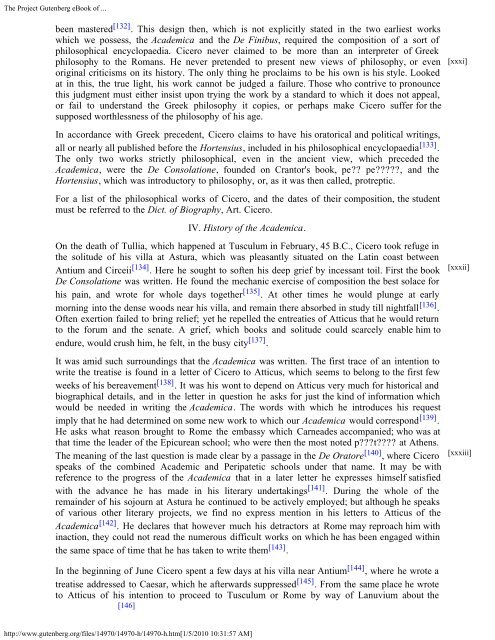academica of cicero. - 912 Freedom Library
academica of cicero. - 912 Freedom Library
academica of cicero. - 912 Freedom Library
You also want an ePaper? Increase the reach of your titles
YUMPU automatically turns print PDFs into web optimized ePapers that Google loves.
The Project Gutenberg eBook <strong>of</strong> ...<br />
been mastered [132] . This design then, which is not explicitly stated in the two earliest works<br />
which we possess, the Academica and the De Finibus, required the composition <strong>of</strong> a sort <strong>of</strong><br />
philosophical encyclopaedia. Cicero never claimed to be more than an interpreter <strong>of</strong> Greek<br />
philosophy to the Romans. He never pretended to present new views <strong>of</strong> philosophy, or even<br />
original criticisms on its history. The only thing he proclaims to be his own is his style. Looked<br />
at in this, the true light, his work cannot be judged a failure. Those who contrive to pronounce<br />
this judgment must either insist upon trying the work by a standard to which it does not appeal,<br />
or fail to understand the Greek philosophy it copies, or perhaps make Cicero suffer for the<br />
supposed worthlessness <strong>of</strong> the philosophy <strong>of</strong> his age.<br />
In accordance with Greek precedent, Cicero claims to have his oratorical and political writings,<br />
all or nearly all published before the Hortensius, included in his philosophical encyclopaedia [133] .<br />
The only two works strictly philosophical, even in the ancient view, which preceded the<br />
Academica, were the De Consolatione, founded on Crantor's book, pe?? pe?????, and the<br />
Hortensius, which was introductory to philosophy, or, as it was then called, protreptic.<br />
For a list <strong>of</strong> the philosophical works <strong>of</strong> Cicero, and the dates <strong>of</strong> their composition, the student<br />
must be referred to the Dict. <strong>of</strong> Biography, Art. Cicero.<br />
IV. History <strong>of</strong> the Academica.<br />
On the death <strong>of</strong> Tullia, which happened at Tusculum in February, 45 B.C., Cicero took refuge in<br />
the solitude <strong>of</strong> his villa at Astura, which was pleasantly situated on the Latin coast between<br />
Antium and Circeii [134] . Here he sought to s<strong>of</strong>ten his deep grief by incessant toil. First the book<br />
De Consolatione was written. He found the mechanic exercise <strong>of</strong> composition the best solace for<br />
his pain, and wrote for whole days together [135] . At other times he would plunge at early<br />
morning into the dense woods near his villa, and remain there absorbed in study till nightfall [136] .<br />
Often exertion failed to bring relief; yet he repelled the entreaties <strong>of</strong> Atticus that he would return<br />
to the forum and the senate. A grief, which books and solitude could scarcely enable him to<br />
endure, would crush him, he felt, in the busy city [137] .<br />
It was amid such surroundings that the Academica was written. The first trace <strong>of</strong> an intention to<br />
write the treatise is found in a letter <strong>of</strong> Cicero to Atticus, which seems to belong to the first few<br />
weeks <strong>of</strong> his bereavement [138] . It was his wont to depend on Atticus very much for historical and<br />
biographical details, and in the letter in question he asks for just the kind <strong>of</strong> information which<br />
would be needed in writing the Academica. The words with which he introduces his request<br />
imply that he had determined on some new work to which our Academica would correspond [139] .<br />
He asks what reason brought to Rome the embassy which Carneades accompanied; who was at<br />
that time the leader <strong>of</strong> the Epicurean school; who were then the most noted p???t???? at Athens.<br />
The meaning <strong>of</strong> the last question is made clear by a passage in the De Oratore [140] , where Cicero<br />
speaks <strong>of</strong> the combined Academic and Peripatetic schools under that name. It may be with<br />
reference to the progress <strong>of</strong> the Academica that in a later letter he expresses himself satisfied<br />
with the advance he has made in his literary undertakings [141] . During the whole <strong>of</strong> the<br />
remainder <strong>of</strong> his sojourn at Astura he continued to be actively employed; but although he speaks<br />
<strong>of</strong> various other literary projects, we find no express mention in his letters to Atticus <strong>of</strong> the<br />
Academica [142] . He declares that however much his detractors at Rome may reproach him with<br />
inaction, they could not read the numerous difficult works on which he has been engaged within<br />
the same space <strong>of</strong> time that he has taken to write them [143] .<br />
In the beginning <strong>of</strong> June Cicero spent a few days at his villa near Antium [144] , where he wrote a<br />
treatise addressed to Caesar, which he afterwards suppressed [145] . From the same place he wrote<br />
to Atticus <strong>of</strong> his intention to proceed to Tusculum or Rome by way <strong>of</strong> Lanuvium about the<br />
[146]<br />
http://www.gutenberg.org/files/14970/14970-h/14970-h.htm[1/5/2010 10:31:57 AM]<br />
[xxxi]<br />
[xxxii]<br />
[xxxiii]















